 Reasons to Go Vegan #11: The Ocean
Reasons to Go Vegan #11: The Ocean
 Overfishing And the Death of the Ocean.
Overfishing And the Death of the Ocean.
 Now I can look at you in peace; I don't eat you anymore.
Now I can look at you in peace; I don't eat you anymore.
—Franz Kafka, while admiring fish in an aquarium.
Humanity is not limiting its impacts to fish most commonly found on menus. Exotic sea creatures from turtles to manta ray to marine mammals are being hunted to extinction. Shark numbers, for example, have declined by 80% worldwide, with one-third of shark species now at risk of extinction. The top marine predator is no longer the shark, it's us. - BBC
-
How the world's oceans could be running out of fish, BBC, 3/2013
 Global fish stocks are exploited or depleted to such an extent that without urgent measures we may be the last generation to catch food from the oceans.
Global fish stocks are exploited or depleted to such an extent that without urgent measures we may be the last generation to catch food from the oceans.
Entire species of marine life will never be seen in the Anthropocene (the Age of Man), let alone tasted, if we do not curb our insatiable voracity for fish. Last year, global fish consumption hit a record high of 17 kg (37 pounds) per person per year, even though global fish stocks have continued to decline. On average, people eat four times as much fish now than they did in 1950.
Around 85% of global fish stocks are over-exploited, depleted, fully exploited or in recovery from exploitation. Only this week, a report suggested there may be fewer than 100 cod over the age of 13 years in the North Sea between the United Kingdom and Scandinavia. The figure is still under dispute, but it's a worrying sign that we could be losing fish old enough to create offspring that replenish populations. More… -
Alaska and the mysterious disappearing king salmon, BBC, 9/2012
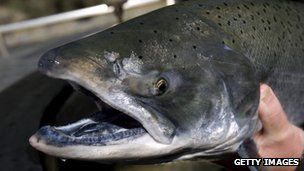 When the number of king salmon running in Crooked Creek's river declined dramatically, the mostly native Alaskan villagers were left wondering where they could find enough food to last the winter.
When the number of king salmon running in Crooked Creek's river declined dramatically, the mostly native Alaskan villagers were left wondering where they could find enough food to last the winter.
Over the past five years, Alaska's king salmon have begun to disappear from the state's rivers, and no-one is sure why.
In an emergency effort to ensure the future survival of the king salmon, state officials have severely limited the catch this year, even going so far as to close some rivers entirely to fishermen. -
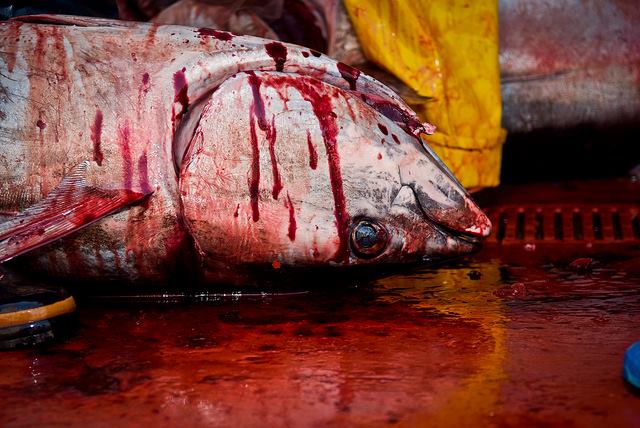 Overfished and under-protected: Oceans on the brink of catastrophic collapse —CNN, 24 March 2013.
Overfished and under-protected: Oceans on the brink of catastrophic collapse —CNN, 24 March 2013.
"The disturbing truth is that humans are having unrecognized impacts on every part of the ocean, and there is much we have not seen that will disappear before we ever get a chance," says O'Dor, who is also a professor of marine biology at Dalhousie University in Halifax, Canada.
….
"I could sum it up as: we need to fish less and in less destructive measures, waste less, pollute less and protect more," says Roberts.
"This change of course will see us rebuild the abundance, variety and vitality of life in the sea which will give the oceans the resilience they need to weather the difficult times ahead. Without such action, our future is bleak." More… -
Overfishing causes Pacific bluefin tuna numbers to drop 96%, The Guardian, 1/2013
Conservationists also warned that the vast majority caught were juveniles and had never reproduced.Bluefin tuna is one of nature's most successful ocean inhabitants, the biggest of the tuna and a top-of-the-food-chain fish with few natural predators. But the advent of industrial fishing methods and a taste for the species among rich sushi devotees have led to its being hunted to the brink of extinction.
If current trends continue, the species will soon be functionally extinct in the Pacific, and the frozen bodies held in a few high-security Asian warehouses will be the last gasp the species.
More than nine out of 10 of the species recently caught were too young to have reproduced, meaning they may have been the last generation of the bluefin tuna. More… -
Why it's a good idea to stop eating shrimp, treehugger, 1/2014
 Shrimp is the most popular seafood in the United States, with Americans eating an average of 4.1 pounds per person annually. As delicious as shrimp may be, we actually should not be eating them. The process that delivers bags of frozen shrimp to your grocery store at cheap prices has devastating ecological consequences, and you?ll probably not want to touch that shrimp ring ever again after reading what's really happening behind the scenes.
Shrimp is the most popular seafood in the United States, with Americans eating an average of 4.1 pounds per person annually. As delicious as shrimp may be, we actually should not be eating them. The process that delivers bags of frozen shrimp to your grocery store at cheap prices has devastating ecological consequences, and you?ll probably not want to touch that shrimp ring ever again after reading what's really happening behind the scenes.
Shrimp is either farmed or wild, but neither option is good for the environment. Farmed shrimp are kept in pools on the coast, where the tide can refresh the water and carry waste out to sea. Ponds are prepared with heavy doses of chemicals such as urea, superphosphate, and diesel. Then the shrimp receive pesticides, antibiotics (some that are banned in the U.S., but used overseas), piscicides (fish-killing chemicals like chlorine), sodium tripolyphosphate, borax, and caustic soda.
Shrimp farmers have destroyed an estimated 38 percent of the world's mangroves to create shrimp ponds, and the damage is permanent. Not only do the mangroves not return long after production has ended, but the surrounding areas become wastelands. According to a Yale University research paper, shrimp farming has made certain areas of Bangladesh completely unlivable for people: "The introduction of brackish-water shrimp aquaculture… has, in turn, caused massive depeasantization and ecological crisis throughout the region." More… -
Why Warming Oceans Could Mean Dwindling Fish, Time, 5/2013
Image: Blue Fin Tuna It's easy to forget that global warming doesn't just refer to the rising temperature of the air. Climate change is having an enormous, if less understood, impact on the oceans, which already absorb far more carbon dioxide than the atmosphere. Like so much of what goes on in the vast depths that cover more than two-thirds of our planet's surface, the effect of climate change on the oceans remains a black box, albeit one that scientists are working to illuminate.
It's easy to forget that global warming doesn't just refer to the rising temperature of the air. Climate change is having an enormous, if less understood, impact on the oceans, which already absorb far more carbon dioxide than the atmosphere. Like so much of what goes on in the vast depths that cover more than two-thirds of our planet's surface, the effect of climate change on the oceans remains a black box, albeit one that scientists are working to illuminate.
… Scientists aren't clear about what effect climate change, including the warming of the oceans, will have on wild fisheries. As Mark Payne of the National Institute of Aquatic Resources writes in a new piece in Nature, ocean researchers "tend to view climate change as a dark cloud on the horizon: potentially problematic in the future, but not of immediate concern" — especially compared with the much more pressing threat of simple overfishing.
But now a new study in Nature makes the case that climate change — including the warming of the oceans — is already having a direct impact on global fisheries. Researchers led by William Cheung at the University of British Columbia's Fisheries Centre created a new model that took the known temperature preferences of different species of commercial fish and compared those figures with catch numbers from around the world. They found that species comfortable in warmer waters have been replacing fish that are more accustomed to cool temperatures. That means climate change is altering the makeup of fisheries around the world — and that could be particularly bad for the tropics, which may eventually become too hot for even for fish that tend to prefer it on the warmer side. More…
The global slaughter of marine wildlife is simply the largest massacre of wildlife on the planet.
—Paul Watson
-
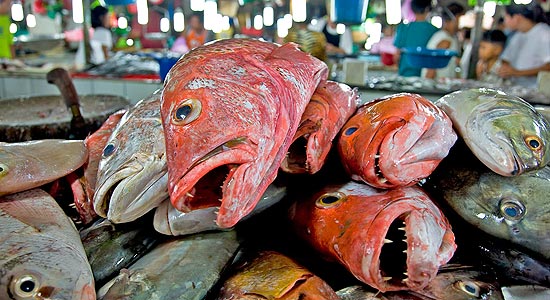 World's Waters Dangerously Overfished —Washington Post, 10/05/2012
World's Waters Dangerously Overfished —Washington Post, 10/05/2012
The study estimates that "over 40 percent of fisheries have crashed or are overfished"--a much higher number than previously reported. These new figures include estimates from unmonitored fish stocks, with those numbers accounting for 80% of the global fish population.
The article points out that it's the lack of government oversight that's endangering the world's aquatic life and our ecosystem.
Apart from destroying the environment and endangering the world's fish population, the fishing industry contributes to some of the most horrific abuse in agribusiness. Industrialized fishing victimizes not only fish, but also countless unintended victims, including dolphins, lobsters, and turtles. Sea animals captured in huge trawling nets undergo excruciatingly painful decompression as they are raised from the ocean depths. The intense internal pressure ruptures fishes' swim bladders, pops out their eyes, and pushes their stomachs through their mouths. -
Depleting Fish Stocks —BBC, 2000.
We have this perception that collapsed stocks will recover right away. That appears not to be the case.
-
Fishing, Animal Equality
Fishing kills billions of individuals every year. It's practically impossible to give specific data on the deaths caused by this practice, since fishes are counted by the tonne and not by the individual. Each fish is an individual with a distinct personality who wants to enjoy their life in freedom and without suffering.
In spite of the initial differences that we can see between fish and other animals (which causes many people to think that they are not capable of feeling), the truth is that there is a great quantity of scientific data which confirms that fishes are anatomically, biologically, and physically just as capable of experiencing suffering and enjoyment as birds, reptiles and mammals. Fishes have nervous systems which cause them to feel pain and enjoyment and respond to sources of pain. Furthermore, just like other animals, they have neurotransmitters similar to endorphins – our body’s response to suffering, and whose only reason for being is to alleviate pain – which clearly demonstrates that fishes are individuals with interests. In spite of this, millions of them die unjustly victims of the fishing industry and sports fishing. More… -
9 Things Everyone Should Know About Farmed Fish, Free From Harm, 12/2013
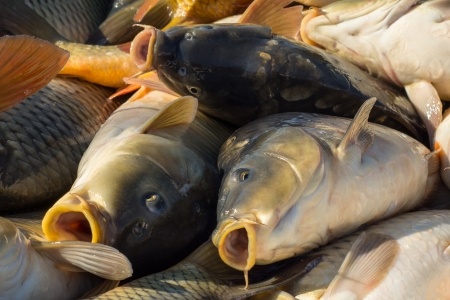 If you eat seafood, unless you catch it yourself or ask the right questions, the odds are pretty good it comes from a fish farm. The aquaculture industry is like a whale on steroids, growing faster than any other animal agriculture segment and now accounting for half the fish eaten in the U.S. As commercial fishing operations continue to strip the world's oceans of life, with one-third of fishing stocks collapsed and the rest headed there by mid-century, fish farming is increasingly seen as a way to meet the world's growing demand.
If you eat seafood, unless you catch it yourself or ask the right questions, the odds are pretty good it comes from a fish farm. The aquaculture industry is like a whale on steroids, growing faster than any other animal agriculture segment and now accounting for half the fish eaten in the U.S. As commercial fishing operations continue to strip the world's oceans of life, with one-third of fishing stocks collapsed and the rest headed there by mid-century, fish farming is increasingly seen as a way to meet the world's growing demand.
This article looks at aquaculture and its long-term effects on people, fish, and other animals. With this industry regularly touted as a paragon of food production, whether you eat seafood or not, you should know these nine key facts about farmed fish. More…
-
Omega-3 not healthy enough to eat into fish stocks, claims study —Canadian Medical Association Journal report
A new research paper on the production of fish-derived fatty acids has concluded that the continued promotion of omega-3s for their health benefits is irresponsible in the face of depleting fish stocks.
For Information on fish and nutrition, See our Nutrition: They Myth of Fish page.
-
How to teach a fish to count —BBC Future, 4/2013
There's a long tradition of psychological and anthropological research on innate counting systems in humans, which underpins familiar popular notions, such as the existence of cultures whose number system goes "one, two, three, many." These simplistic ideas can obscure the fact that even some non-human animals recognise that there are different degrees of "many"ù: that ten objects are not equivalent to a hundred.
Does this mean fish are smarter than we give them credit for? You could choose to see it that way, but in fact it supports a growing recognition that cognitive processes like counting, which we might imagine to be quite complex, can in fact be achieved with a surprisingly small number of neurons. Counting and comparing numbers might not be as hard as we think. More…
This is the future if we do not stop, think and act."
The End of the Line.
Solutions

600 meters = nearly 2000' | 50km = 31 miles.

600 meters = nearly 2000' | 50km = 31 miles.
- What You Can Do to Help Oceans and Ocean Animals Easy ways to make a difference, Humane Society US., 3/12.
-
The Marine Mammal Center - What We Do
Our mission is to expand knowledge about marine mammals?their health and that of their ocean environment?and to inspire their global conservation. Our core work is the rescue and rehabilitation of sick and injured marine mammals, supported by state-of-the-art animal care and research facilities, a corps of dedicated volunteers, and an engaged community. More…
|
iPhon/iPad App
Protect Seals Humane Society of the US 
|
|
Online Book
Updated May 6, 2013 Greenpeace 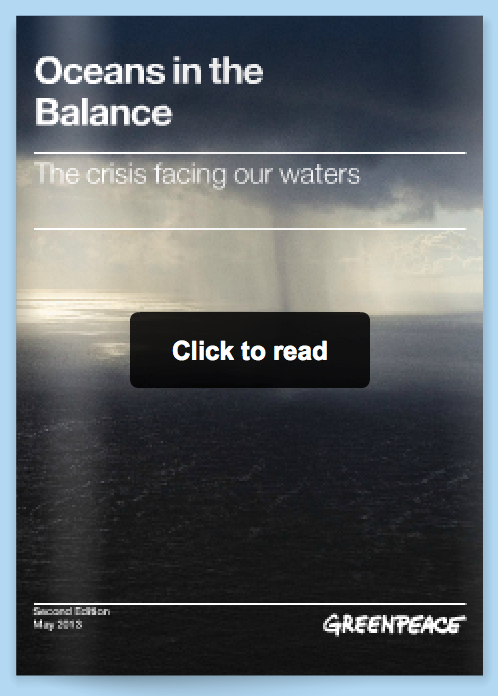
|
Still not convinced? Listen to these.
For further in depth data
See our Resources pages including books, films, local restaurants and more.
Top ↑

 Your Health
Your Health Physiology
Physiology Abuse/Cruelty
Abuse/Cruelty Dairy
Dairy The Planet
The Planet Pollution
Pollution Veal
Veal Palm Oil
Palm Oil Global Warming
Global Warming Animal Acts
Animal Acts Slaughter
Slaughter Wool
Wool Lab Animals
Lab Animals




